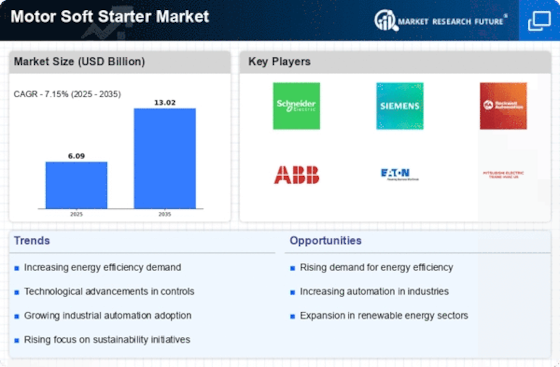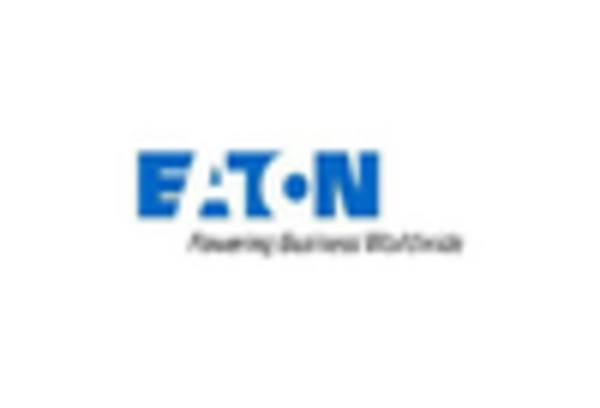Growth in Renewable Energy Sector
The growth in the renewable energy sector appears to be a significant driver for the Motor Soft Starter Market. As the world shifts towards sustainable energy sources, the integration of motor soft starters in renewable energy applications, such as wind and solar power, is becoming increasingly prevalent. These devices are essential for managing the startup and operation of various motors used in renewable energy systems, ensuring optimal performance and reliability. The renewable energy market is expected to witness substantial growth, with investments projected to reach trillions of dollars in the coming years. This expansion is likely to create new opportunities for the Motor Soft Starter Market, as the demand for efficient motor control solutions in renewable applications rises.
Expansion of Industrial Automation
The ongoing expansion of industrial automation is likely to significantly influence the Motor Soft Starter Market. As industries increasingly adopt automated processes to enhance productivity and efficiency, the need for reliable motor control solutions becomes paramount. Motor soft starters play a crucial role in this context by providing controlled acceleration and deceleration of motors, which helps in preventing mechanical stress and prolonging equipment life. The market for industrial automation is projected to grow at a compound annual growth rate of over 9%, suggesting a robust demand for motor soft starters as integral components of automated systems. This trend indicates a promising outlook for the Motor Soft Starter Market.
Regulatory Compliance and Standards
Regulatory compliance and adherence to industry standards are increasingly shaping the Motor Soft Starter Market. Governments and regulatory bodies are implementing stringent energy efficiency and safety standards that necessitate the use of advanced motor control technologies. Motor soft starters not only help in meeting these regulations but also enhance operational safety by reducing electrical and mechanical stresses on motors. As industries strive to comply with these evolving regulations, the demand for motor soft starters is expected to rise. This trend is particularly relevant in sectors such as oil and gas, where compliance with safety standards is critical. The emphasis on regulatory compliance is likely to drive the Motor Soft Starter Market in the coming years.
Rising Demand for Energy Efficiency
The increasing emphasis on energy efficiency across various industries appears to be a primary driver for the Motor Soft Starter Market. As organizations strive to reduce operational costs and minimize their carbon footprint, the adoption of motor soft starters has gained traction. These devices facilitate smoother motor operations, thereby reducing energy consumption during startup. According to recent data, the energy savings achieved through the use of motor soft starters can reach up to 30%, making them an attractive option for industries such as manufacturing and HVAC. This trend indicates a growing recognition of the importance of energy-efficient solutions, which is likely to propel the Motor Soft Starter Market forward.
Increasing Focus on Equipment Longevity
The increasing focus on equipment longevity and maintenance is another critical driver for the Motor Soft Starter Market. Industries are recognizing the importance of minimizing downtime and extending the lifespan of their machinery. Motor soft starters contribute to this goal by reducing mechanical stress during motor startup, which can lead to wear and tear over time. By implementing motor soft starters, companies can enhance the reliability of their equipment and reduce maintenance costs. This trend is particularly evident in sectors such as mining and manufacturing, where equipment failure can result in significant financial losses. As organizations prioritize equipment longevity, the Motor Soft Starter Market is likely to experience sustained growth.

















